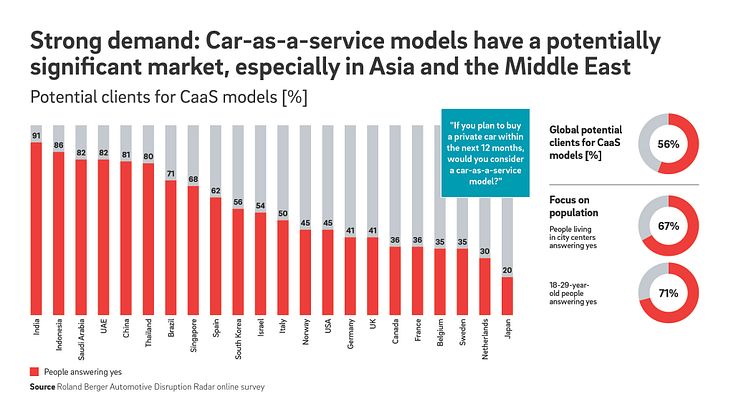Electric vehicle sales continue to rise, despite challenging economic times with increasing inflation and energy prices. According to Roland Berger’s latest “Automotive Disruption Radar” (ADR 12), the share of electric vehicles in the analyzed countries is up to an all-time high of 13.2 percent – almost twice the share from the previous 12 months (6.9 percent) and quadrupling since ADR8 in 2020 (3.3 percent). The twice-yearly report, which tracks 26 automotive indicators across 22 countries, also signals a shift away from traditional ownership models. Interest in car-as-a-service (CaaS) models has increased by 11 percent since 2019.
“The recent economic challenges for the automotive industry, caused by the pandemic, supply chain issues and the shortage on semiconductors, have not slowed down the push towards electrification,” says Stefan Riederle, Partner at Roland Berger. “For example, in China, which had production stops as a result of Covid lockdowns, the electric vehicle sales are up to 23 percent. As governments in more and more countries are introducing regulation and restrictions on internal combustion engines, this trend will only continue.”
Appetite for mobility sees Singapore surge ahead
A top three finisher in previous editions of the ADR, Singapore leap-frogged both China and the Netherlands to secure the top position for the first time. The city-state performed especially well on mobility indicators, with 15 percent of the distance traveled by Singaporeans being via demand-driven modes (car sharing, ride-hailing, etc.) and 46 percent via public transport.
Previous ranking leader China drops down to second place but remains the most enthusiastic about electric vehicles. As many as 90 percent of buyers said they would consider an EV for their next vehicle purchase. Due to ongoing supply chain issues in Europe, ADR10 leader the Netherlands continue their slide down the ranking into third position, where they are joined by Norway. The Scandinavian country recorded by far the highest number of EV sales of any nation – 76 percent of new car sales in the country are all-electric, PHEV (Plug-in Hybrid EV) or FCEV (Fuel Cell EV). The next best performer in that category is Sweden, with 47 percent.
Mobility bounces back as Covid fears subside
Demand for mobility solutions, such as ride hailing, e-scooters, and public transport, crumbled during the peak of the Covid-19 pandemic but is on the rise again – in some cases even exceeding pre-pandemic levels – as fears of infection ease. The latest ADR survey found that 65 percent of the respondents know at least one person who gave up a private car in favor of alternative transport modes, compared to 55 percent in 2020. This sentiment is particularly strong in India, Singapore and Indonesia.
Demand for flexibility boosts the popularity of CaaS models
There is a growing trend towards all-inclusive CaaS models, as consumers turn away from traditional purchase or leasing options in favor of flexible subscription models. More than half (56 percent) of car buyers indicated they would consider a CaaS model, while 45 percent said they would be willing to pay a 20 percent premium on equivalent leasing rates for the sake of flexibility.
“Consumer habits are changing and customers, especially in the younger generations, are becoming more inclined to sign up to subscription models that provide convenience and flexibility,” says Riederle. “It is important that OEMs adapt to this trend by offering more flexible payment solutions and comprehensive car-as-a-service options.”
SOURCE: Roland Berger


